
B.C. Ports Labor Dispute Drags On (UPDATED July 12)
Written by Nick Blenkey, Senior Editorial Consultant and Web Editor, Marine Log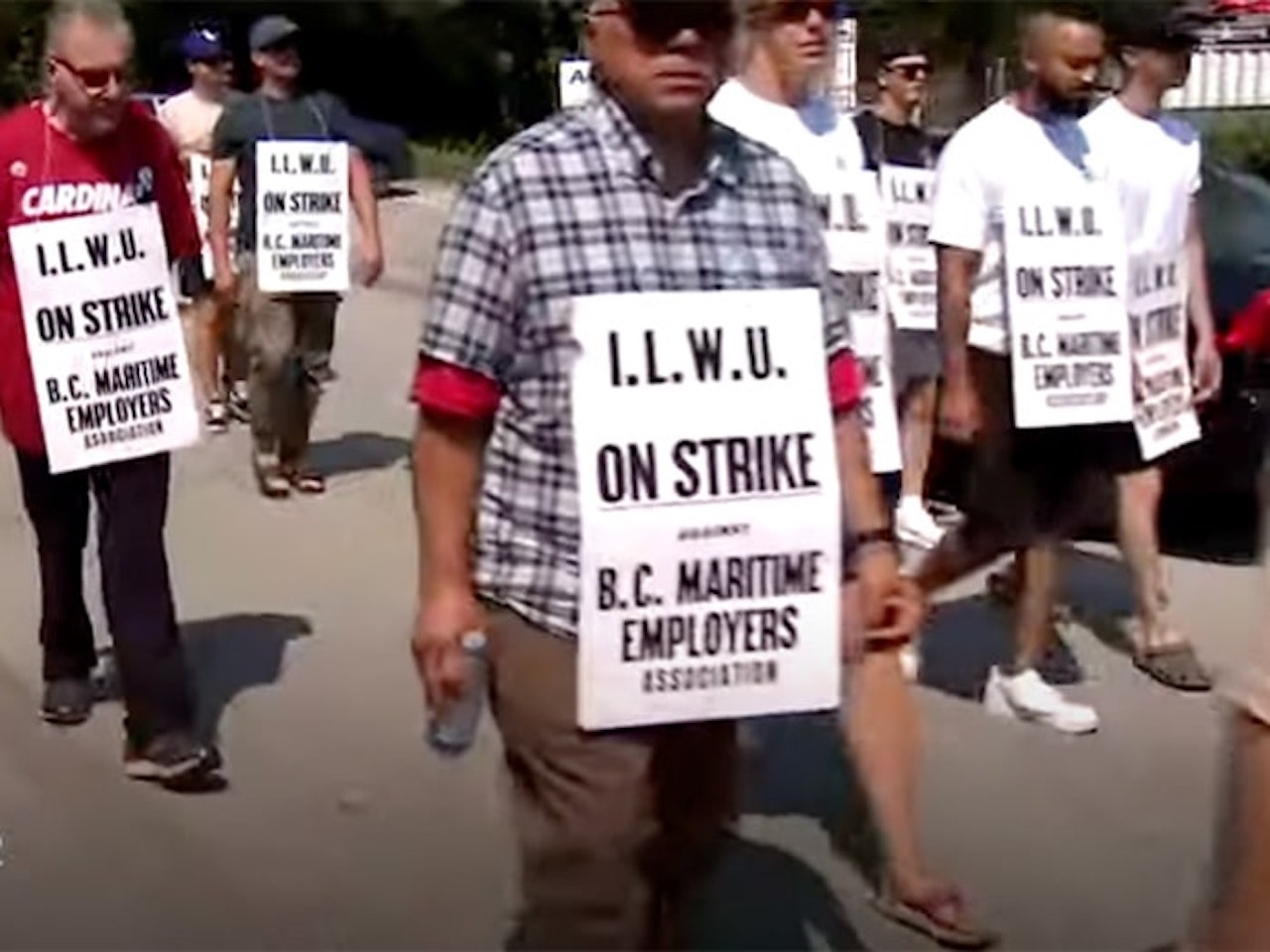
IMAGE: Screen grab from CBC News video
While the U.S. West Coast ports labor dispute last month reached a point where a tentative labor agreement could be reached, there’s as yet no sign of any such breakthrough in Canada’s ongoing B.C. ports dispute. The strike on July 12 entered its 12th day.
Canada’s Financial Post reports that thousands of union members at the ports stopped working on July 1 after negotiations linked to their wages, benefits and employment conditions failed to make headway.
The Issue
At the core of the B.C. ports dispute appears to be maintenance work. The labor side, ILWU Canada, says, “The key issue that is holding up getting a deal is contracting out of ILWU maintenance work by member employers of the BCMEA [British Columbia Marine Employers Association] and the refusal of the association and its member companies to agree on a regular maintenance document that is all but complete – except for one sentence.”
The employer side, BCMEA, says, “ILWU Canada is attempting to aggressively expand their scope and re-define Regular Maintenance Work far beyond what is set out in the industry-wide agreement, which has been legally well established for decades. Changing this definition would result in immediate and significant impacts to terminal operations. Under the current collective agreement, the ILWU exclusively supplies the labor force, however, it has been consistently unable to fulfill the trades work they have jurisdiction over.
“In the last year, there were significant shortages in key trades work. For example, in Vancouver, up to 25% of specific jobs were left unfilled as labor was not sufficiently supplied. On average, of the trades work that the ILWU Canada is exclusively entitled to supply in Vancouver, 17% of jobs went unfilled last year. This lack of labor supply has immediate impacts on terminal productivity as regular maintenance of cargo-moving equipment goes unaddressed and delayed. There is a mutual interest in both parties working together to resolve the existing labor shortage issue, but ILWU Canada is solely focused on expanding their jurisdiction to other work. The BCMEA continues to make record investments into training and upskilling the workforce including a budgeted $42.5 million in 2023.”
ILWU Canada says, “Our jurisdiction in maintenance has been aggressively eroded by member employers by using 3rd party contractors. This is not an issue of cost for the direct employers because they already pay for this work to be done by maintenance contracting companies. In fact, using ILWU skilled trades employees will be more cost effective and will result in a higher quality of work because of their industry experience and competency.
“Neither is this an issue of the union being unable to supply skilled trades. It is an unwillingness of the employers to properly utilize our trades workers. We already have sufficient numbers of registered trades workers to meet the demands of the industry and we continue to recruit more. The issue is that the BCMEA member employers refuse to utilize them or train them as required. The BCMEA is well aware of the commitment the Union has already made in bargaining on how to improve trades utilization, but they have refused to acknowledge the solution.”
Where Are the Negotiations Now?
Canada’s Federal Mediation and Conciliation Service continues to attempt to broker a deal in the dispute.
According to a statement released yesterday by ILWU Canada:
“On July 3, 2023, while the union was at the Federal Mediation and Conciliation Service (FMCS) waiting for a response from the employer we received a message from the mediators, that the BCMEA walked away from the table. The Union delivered a message to the federal mediators that the Union will not walk away from negotiations, we are available every day, at any hour of the day. We expressed to the mediators our disappointment that the BCMEA had abandoned talks.”
The union added that its bargaining committee had met with federal mediators earlier today and proposed a meeting with four irect employers to discuss with them directly a possible solution to the maintenance issue in the hopes of moving these negotiations forward.
The union requested to meet directly with the following presidents and CEOs:
Eric Waltz – Global Container Terminals Canada, Douglas Smith – DP World Canada, Craig Olley – Neptune Terminals, and Don Nonis – Pembina (also Chair of the BCMEA Board).
“We support Labor Minister Seamus O’Regan’s call today to immediately return to the bargaining table and remain until a deal is reached, so we call on the BCMEA to get back to the table and do the hard work necessary to reach an agreement,” said the union. “If the association will not negotiate, we call on the member employers to negotiate directly with the union. A negotiated settlement is possible, and we are capable of getting the job done.”
A statement released by BCMEA yesterday concluded:
“We continue to stay in contact with the Federal Mediation and Conciliation Service on next steps.
“We recognize the dire impact this ongoing strike is having on Canada’s economy and Canadians – we remain ready to reach a fair and balanced deal so ports can open, and goods can start flowing as soon as possible.
“The BCMEA’s continued preference is to negotiate a fair and balanced deal at the table with ILWU Canada. Voluntary mediation-arbitration remains as an option to immediately restore stability to the supply chain.
“ILWU Canada and the BCMEA have a shared interest in seeing this resolved in an efficient manner. We are both invested in a stable, reliable waterfront that recognizes the skills of our workforce.”
Growing Economic Consequences
Meantime, broadcaster CBC reports that, as the B.C. ports strikes continue, fears are mounting over major economic impacts.
Meanwhile, Canadian Pacific Kansas City (CPKC) says it has placed “temporary embargoes” on export traffic to the Port of Vancouver, as the strike drags into its fifth day, according to a CBC News report.
CPKC’s Patrick Waldon says the railroad is “closely monitoring” developments and is in direct communication with customers about the strike.
Waldon, according to the report, added that the railway wants a “swift resolution” to protect North American supply chains and Canada’s economy, and that embargoes have been issued for the Port of Vancouver in a way that is “allowing traffic to move west while protecting network fluidity.”
“Where possible, CN has taken steps to help mitigate the service disruptions to Canada’s West Coast port supply chains, as well as the likelihood of related impacts across the CN network,” stated a CN spokesperson. “Those steps include preventing the flow of certain traffic, and reducing intermodal customer capacity allocations to British Columbia ports.”
“BC ports handle more than $800 million worth of cargo every day—goods that Canadians need. We urge both parties and the federal government to do what is necessary to get goods moving again,” the CN spokesperson added.
A representative for BNSF, which also serves the Port of Vancouver, did not immediately respond to a Railway Age request for comment.
RailState Rail Movement Report
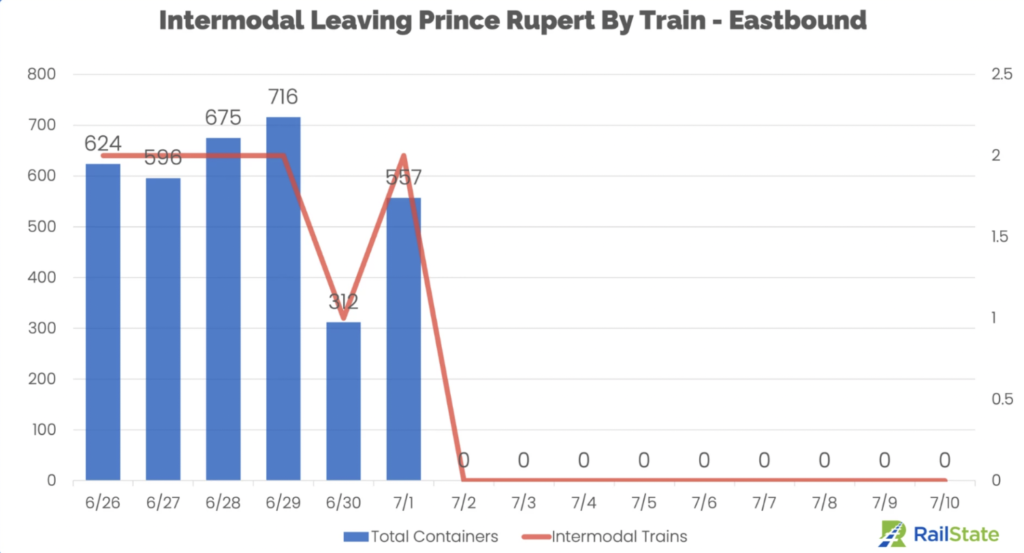
RailState on July 11 released a report on recent rail movements in Canada. As a provider of “real-time rail network visibility,” the company said it “independently tracks all freight rail movements across Canada, and as such, is uniquely positioned to observe the initial impacts on rail from the strike at the B.C. ports.” Here are its findings:
“As the strike by the International Longshore and Warehouse Union Canada (ILWU Canada) enters its second week, RailState is closely monitoring the flows of rail traffic in the western ports region and the impact on rail traffic throughout Canada and into the United States.
“The most dramatic change has been in intermodal. All non-domestic intermodal rail traffic into and out of the Ports of Vancouver and Prince Rupert has stopped.
“Since the strike started, the volume of imported containers moving on rail out of the Port of Vancouver has plummeted. (The only movement of 20’ and 40’ containers out of the port over the past week have been on domestic intermodal trains.)
“Likely in anticipation of the strike, containers were loaded on trains before July 1 and the trains moved out of the port on the day the strike began, explaining the higher volumes of trains and container movement on July 1.
“In June, there were 1,182 imported containers moving eastbound out of the port each day.
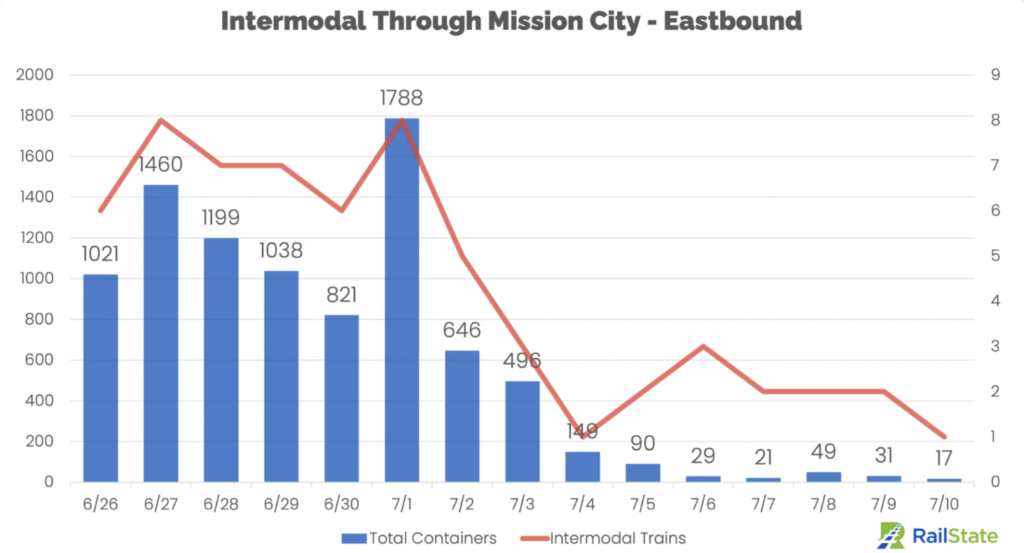
“The railroads stopped taking orders for most exports out of the western ports and we have seen westbound intermodal to the ports for export mostly come to a stop. Drops in this traffic would be expected to lag behind eastbound movements as shippers change routes and shipments already enroute arrive on the west coast. The vast majority of shipments from eastern Canada already enroute to the west coast when the strike began would have arrived by now.
“The Port of Vancouver typically sees an even balance of containers moving into and out of the port. In June, there were 1,181 containers moving on rail westbound into the port each day on average.
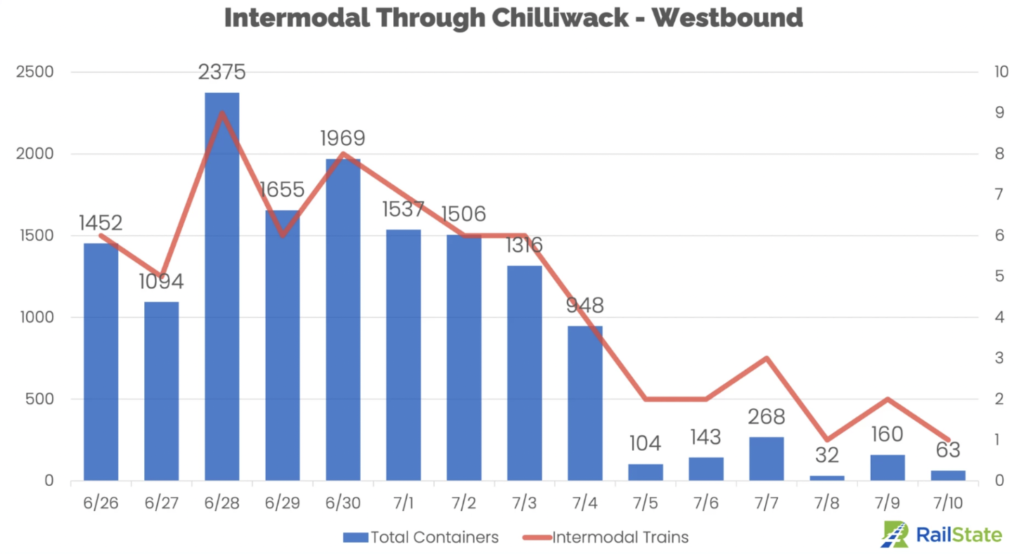
“Intermodal rail traffic eastbound out of Prince Rupert completely halted once loaded trains exited on the first day of the strike.
“Prince Rupert sees less intermodal traffic than the Port of Vancouver and, in June, the port averaged 543 imported containers moving eastbound on rail each day.

“Traffic westbound into the port has also slowed and there is now no intermodal moving into the port by rail.
“Last month, the port saw an average of 496 containers moving westbound on rail each day.”
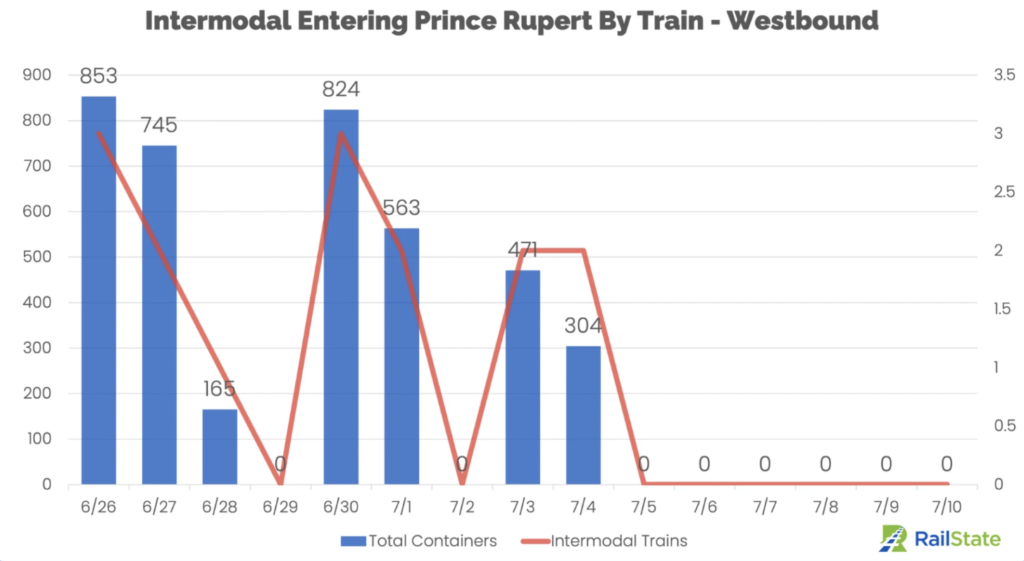
Railway Age Senior Editor Carolina Worrell and Executive Editor Marybeth Luczak contributed to this story.



